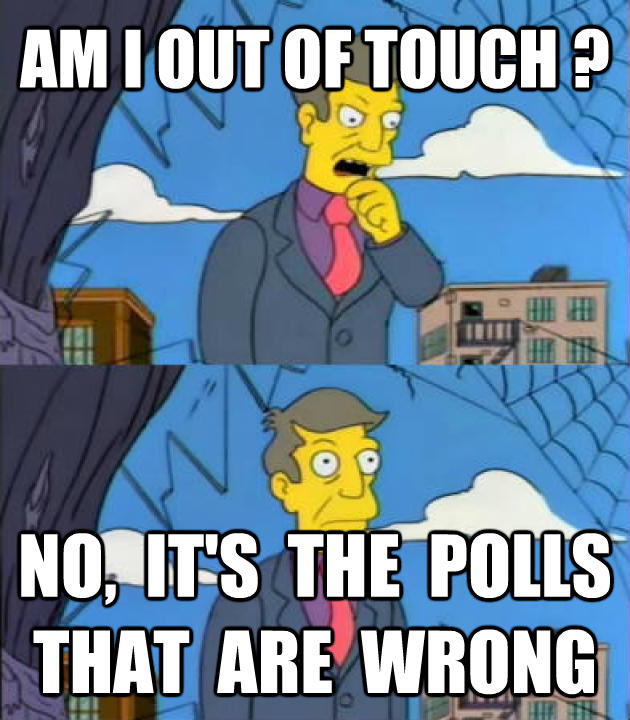Well, the verdict is in on last night’s first Democratic Primary Debate, and it’s perfectly clear that… well, either Hillary Clinton or Bernie Sanders “won.” Read on.
***
When it comes to determining the winner of a multi-candidate debate, it’s notoriously difficult to judge who “won.” Why? Well, for starters, there are no hard and fast criteria to distinguish “winning” from “losing.” Sure, you can get a consensus of viewers — everyone agrees, for instance, that none of the other “also-rans” won the debate. They had a hard time getting a word in edgewise as Clinton and Sanders dominated discussion (even when, paradoxically, they answered by saying they wouldn’t answer). One candidate resorted to defending poorly-chosen votes with the death of his father and the overwhelming vote tallies that agreed with him at the time, a combination that really seemed to come off as the political equivalents of “temporary insanity” and “everyone was doing it.” Another reminded everyone he’d totally killed a guy. They did not win the debate.
But when there are two strong candidates, you can have a dissent in opinion, probably dictated by confirmation bias, among other things. But the split in this one is a little stranger than that.
The pundits by-and-large seemed to favour Clinton. Slate, the Guardian, Politico, and the New Yorker all published editorials calling her the night’s big winner. Notable standout Salon disagreed, while Slate’s DoubleX column split the difference with the headline: “Yes, Hillary Clinton won the debate… but Bernie Sanders set the terms.”
But the polls seemed to largely favour Sanders. DailyKos, the Fusion focus group, the CNN focus group, the CNN online poll (remember this was, technically, the CNN debate), this Fox5 poll, even Slate’s own poll pegged Sanders as the winner.
So what’s going on?
I don’t know for sure, but I have a theory (that’s how these “thinking out loud” posts seem to go, right?) and I’ll tell it to you. I think the pundits and the public are asking two different questions.
The pundits are looking at a group of professional politicians and asking “who is the better politician?” The general public, represented by the people polled, are looking at a group of people with a lot more power than they have and asking “who would I rather have as president?” (or even the more gauche, “who do I like better?”).
Because Hillary Clinton is a better politician. By far. She has grace, aplomb, tact, wit, snark, and the diplomacy to know exactly when to apply each and every one of them. She is smooth, brilliant, and solid. She would make an excellent president.
Bernie Sanders is an angry old man. He stammers sometimes, and his hair’s kind of weird, and he’s got a thick regional accent. But he knows his stuff like it’s written on the insides of his eyelids, and he’s angry at exactly the things so many left-leaning Americans are also angry about.
If Hillary Clinton is the Democratic Party’s well-polished superego, Bernie Sanders is its shaggy, ragged id. He’s giving voice to all the things Americans are tired of hiding behind the sensible, electable pronouncements of politicians, in favour of something, well, more “genuine” feeling. Bernie Sanders isn’t a very good politician. A number of writers have genuinely said what Andy Borowitz made fun of in his satire coverage of the debate:
People who follow politics have a hard time not seeing that as a flaw in a debate. He gave up ground — even if only a little — by agreeing with Clinton, even if it helped him get his point across. It’s not the best move, if you view it like a sport. If you view it like a politician. Ten points from Hufflepuff.
But the masses (and those polled) may have seen something different.
They may have seen the friendly side of a guy who only looks mad because he wants you to be treated better. They may have recognized in Bernie Sanders what I saw in that moment: not the angry bully, but the antisocial kid who stood up for you in the playground that time when someone else had been taking your lunch money for two weeks, even as the popular kids had walked on by. Sure, the others might have applauded him (or her!) for their good deed afterward, but that kid was the one that actually did something.
It wouldn’t have won the kid a student council election if he’d ever run; but if he had run, you’d have given him your vote.
I think we’re looking for different things. So if you ask me, it’s going to be an interesting election.
***
Richard Ford Burley is a doctoral candidate in English at Boston College, where he’s writing about remix culture and the processes that generate texts in the Middle Ages and on the internet. In his spare time he writes about science, skepticism, and feminism (and presidential candidates) here at This Week In Tomorrow.

